雅思口语话题Part1工作教师版
雅思口语Part1范文:Teachers教师

雅思口语Part1范文:Teachers教师1.Do you think you could be a teacher?I don’t think I am suitable to be a teacher, I am not a patient man and cannot bear to repeat the same things frequently. Teachers’ job is really boring to me, you have to make your explanations as easy as possible for students to fully understand. It is a challenging job, I am afraid I cannot do it.2.Do you have a favourite teacher?Um… Yeah, I suppose I do, but it’s actual ly kind of hard to pick out a favourite because I’ve been really lucky with all my teachers. You know, they’ve been really great, at least most of them anyway, but I guess my favourite teacher would have to be my Chinese language teacher, because she was incredible. I mean, the amount of effort she put into her teaching, and her attention to detail, were just amazing. And not only that, but she also showed a genuine care for all of us, which left a really deep impression on me. So yeah, out of all my teache rs, I’d say she was probably my favourite.3.What are the qualities of a good teacher?I should say a good teacher is one who always is well prepared for the class. And I guess if the person has a good sense of humour that would help because, you know, boring, ah, session, nobody would sit in the class, you know, hours after hours.4.Should teachers use discipline in the classroom?Coming from where I, um, am, I think yes, teachers should discipline students. In Korea, students would respect the teachers. M y mum’s generation was more so, and my mum had to say one day, she thought teachers don’t eat, don’t go to the toilet,they are demi-Gods and wouldn’t even step on the shadow of the teacher, because you respect the teacher so much. But I don’t think same k ind of respect is here and students sometimes misbehave during class hours and I just find it hard to understand.5.Do you want to be a teacher someday?Umm! not really. I have not given it that much thought. But among my many career plans, entering in the teaching profession is not the one that ever attracted me.6.Why people choose to become teachers?People mostly choose to be teachers because this is the profession which is praised across the world. People always pay proper respect to a teacher regardless of geographical location. Moreover, when the knowledge is spread among the students, the teachers receive an unimaginable pleasure.7.What kind of person makes a good teacher?Teaching is considered as the best profession in the world. The teachers help thestudents to grow. So, to be a good teacher, one needs to be sincere and punctual. Moreover, vast subject knowledge is also required or you cannot share knowledge with your students. Behaving gently with the students is also a standard to be a good teacher.8.Do you like strict teachers?Yeah I do. I have no problem with them at all, as long as they’re fair! Because I think, on the whole, they tend to set high standards, and so consequently, that makes us work harder and learn more. And the other good thing about strict teachers is that they keep students in line, which means that the class won’t be interrupted by slackers who just want to joke around and be anuisance.9.What’s the difference between young and old teachers?There’s probably not all that much difference actually, but I guess the main one would be the level of experience. You know, I think it’s fair to say that old teachers tend to have more experience than young ones, and so they’ll be more skilled at adapting to any kind of situation that might arise in class, whereas young teachers might struggle. So that’s one difference, and I suppose another might be the use of technology, cos probably a lot of old teachers might stick to the traditional teaching methods they’re familiar with, whereas young teachers, I think, are more likely to bring technology into their teaching, such as using iPads and laptops in class. So yeah, I’d say these are probably the main differences.。
雅思口语话题范文:describeawellpaidjob(老师篇)
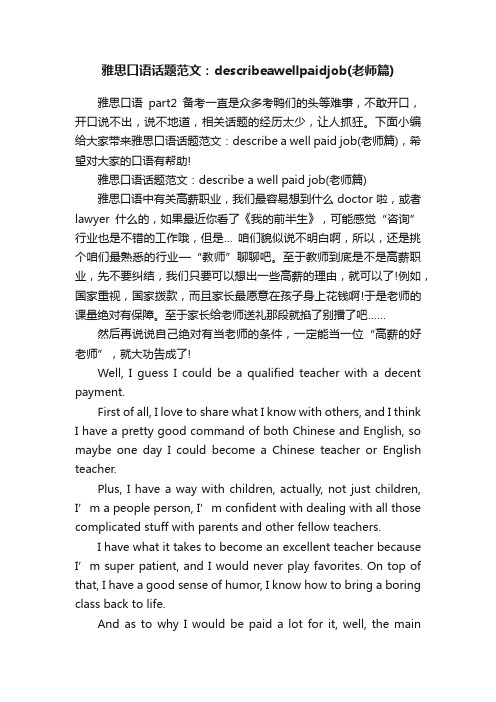
雅思口语话题范文:describeawellpaidjob(老师篇)雅思口语part2备考一直是众多考鸭们的头等难事,不敢开口,开口说不出,说不地道,相关话题的经历太少,让人抓狂。
下面小编给大家带来雅思口语话题范文:describe a well paid job(老师篇),希望对大家的口语有帮助!雅思口语话题范文:describe a well paid job(老师篇)雅思口语中有关高薪职业,我们最容易想到什么doctor啦,或者lawyer什么的,如果最近你看了《我的前半生》,可能感觉“咨询”行业也是不错的工作哦,但是… 咱们貌似说不明白啊,所以,还是挑个咱们最熟悉的行业—“教师”聊聊吧。
至于教师到底是不是高薪职业,先不要纠结,我们只要可以想出一些高薪的理由,就可以了!例如,国家重视,国家拨款,而且家长最愿意在孩子身上花钱啊!于是老师的课量绝对有保障。
至于家长给老师送礼那段就掐了别播了吧……然后再说说自己绝对有当老师的条件,一定能当一位“高薪的好老师”,就大功告成了!Well, I guess I could be a qualified teacher with a decent payment.First of all, I love to share what I know with others, and I think I have a pretty good command of both Chinese and English, so maybe one day I could become a Chinese teacher or English teacher.Plus, I have a way with children, actually, not just children, I’m a people person, I’m confident with dealing with all those complicated stuff with parents and other fellow teachers.I have what it takes to become an excellent teacher because I’m super patient, and I would never play favorites. On top of that, I have a good sense of humor, I know how to bring a boring class back to life.And as to why I would be paid a lot for it, well, the mainreason is that our country attaches great importance to education, they believe that the next generation is the future of our country, so they would invest a lot in this area, and they have given teachers a huge raise to keep them motivated and encourage more people to devote themselves in this career.And parents are super generous when it comes to their children’s education. They are willing to pay a huge amount of money for the after school classes and tutors.语言点解析:qualified = having passed the exams or completed the training that are necessary in order to do a particular job; having the experience to do a particular job 例如:She's extremely well qualified for the job.have a way with somebody/something = to be good at dealing with somebody/something 例如:He has a way with small children.She has a way with words (= is very good at expressing herself).people person = a person who enjoys, and is good at, being with and talking to other peoplehave (got) what it takes = to have the qualities, ability, etc. needed to be successfulplay favorites = to give preferable treatment to someone or something one likes or favors more than others. 例如:The teacher is always playing favorites in class, letting the students she likes go home a little bit earlier than the rest.As an MP, I promise not to play favorites with our public services.on top of that = in addition to the things (usually bad things) already mentioned 例如:We missed the bus, and on top of that it started raining.bring somebody/something to life = to make somebody/ something more interesting or exciting 例如:The new teacher really brought French to life for us.Flowers can bring a dull room back to life.attach great importance/weight/value to = to believe that something is important or worth thinking about 例如:They attach great importance to the project.I wouldn't attach too much weight to these findings.when it comes to something / doing something = when it is a question of something 例如:When it comes to getting things done, he's useless.雅思口语p2话题范文:well-paid job you would like to doYou should say:What the job isHow you came to know about itWhat kind of people can do this jobAnd explain why you like this job话题解读:不知道为什么,雅思口语里提到well-paid job很多孩子会想到programmer,大概是进入到科技时代,他们就是可以用键盘改变世界的人吧!如此powerful的职业,必然报酬颇丰。
雅思口语part1话题之老师[范文模版]
![雅思口语part1话题之老师[范文模版]](https://img.taocdn.com/s3/m/1df0de3f2379168884868762caaedd3383c4b501.png)
雅思口语part1话题之老师[范文模版]第一篇:雅思口语part1话题之老师[范文模版]详解雅思口语part2分类话题对于雅思口语考试,烤鸭们应该都知道雅思口语part2的话题一般是按类别备考会更加方便且有效。
而对于雅思口语part2所包含的话题类别:地点类、物品类、人物类、事件类等几大话题,想必大家是十分了解的,当然还有传媒喜好类话题,但是出现频率极少,因此,今天小编就为大家详细讲解雅思口语part2分类话题的这几大类话题,供大家参考。
1.雅思口语part2人物类话题人物类话题即要求描述某个人,我们可以把此类话题在细分为亲近关系和个人熟悉两大类。
而亲近关系则包含:朋友、邻居、老人、同学、老师、孩子。
个人熟悉包括:著名人物、成功人士、历史人物、影视角色。
我们在解答此类话题的时候也可以按照两大类的话题来进行。
首先,亲近关系话题思路:1.介绍introduction;2.外貌appearance;3.性格personality;4.unforgettable event。
但是此类话题的描述重点需要大家注意:侧重描述经历和事件来扩充内容,晚上答题思路。
其次,1.关键词2.具体项目解析3.著名的原因:1)冠军;2)打破世界记录;3)为国争光;4)个人精神-毅力,奋斗,坚持等。
此类话题描述的重点:侧重限定词的描述,即上述的关键词,通过对所做事情的解析,即“……的原因”分析来体现关键词的特点,并扩充内容。
2.雅思口语part2地点类话题根据对历年雅思口语真题的分析,我们将地点类话题分为三大类:buildings, places, scenic spots.其中buildings包括:Describe a library、a museum、a building in your university、a monument in your city、your ideal house;Places包括:Describe a restaurant、a shopping center、a street、a hotel、a city you visited、a place with water;Scenic spots包括:Describe a historical place、a natural beauty、a river or lake根据三类不同的话题,我们这里提供三种不同的解题思路:a.Buildings 具体到抽象逐步描述法按照如下顺序进行具体地点的描述:位置——外部结构——内部陈设——功能——身体健康的影响——心理健康的影响……这样大家在没有任何指导和提示的情况下就会比较有方向,有话可说。
雅思part 1 work 话题
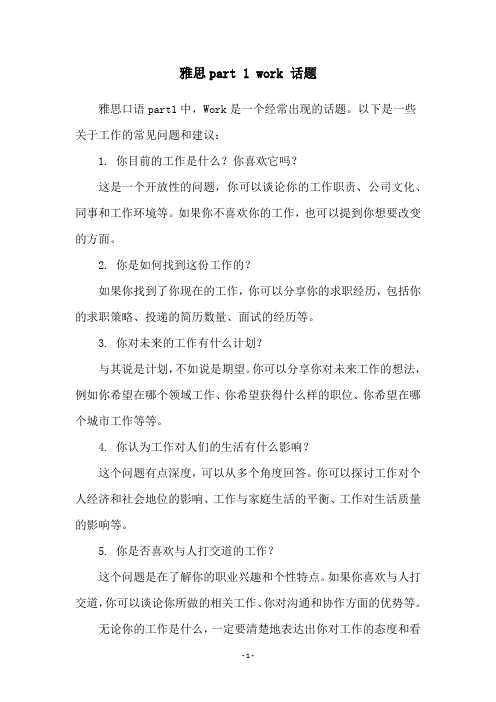
雅思part 1 work 话题
雅思口语part1中,Work是一个经常出现的话题。
以下是一些关于工作的常见问题和建议:
1. 你目前的工作是什么?你喜欢它吗?
这是一个开放性的问题,你可以谈论你的工作职责、公司文化、同事和工作环境等。
如果你不喜欢你的工作,也可以提到你想要改变的方面。
2. 你是如何找到这份工作的?
如果你找到了你现在的工作,你可以分享你的求职经历,包括你的求职策略、投递的简历数量、面试的经历等。
3. 你对未来的工作有什么计划?
与其说是计划,不如说是期望。
你可以分享你对未来工作的想法,例如你希望在哪个领域工作、你希望获得什么样的职位、你希望在哪个城市工作等等。
4. 你认为工作对人们的生活有什么影响?
这个问题有点深度,可以从多个角度回答。
你可以探讨工作对个人经济和社会地位的影响、工作与家庭生活的平衡、工作对生活质量的影响等。
5. 你是否喜欢与人打交道的工作?
这个问题是在了解你的职业兴趣和个性特点。
如果你喜欢与人打交道,你可以谈论你所做的相关工作、你对沟通和协作方面的优势等。
无论你的工作是什么,一定要清楚地表达出你对工作的态度和看
法。
尽可能使用具体的例子和细节来支持你的回答,这样会使你的回答更加生动和有说服力。
雅思口语Part1答案:Teachers老师

雅思口语Part1答案:Teachers老师1. What do you think of teachers?Teachers normally serve as role models, because students and young children are likely to imitate their behaviour. So, teachers should have high moral standards. Moreover, elementary school teachers should be patient enough, because these students are naughty and lack self-discipline.教师一般是充当榜样的,因为学生和孩子们很可能模仿他们的行为。
所以,教师们要有极大的道德标准。
而且,小学老师还应该充足有耐心,因为这些学生都比较淘气而且缺乏自律。
2. Did you (do you) like your high school teachers?I love my teacher, well I think, I can say she is a qualified teacher that she not only provides instruction in literacy and numeracy, but also teaches us the arts and life skills. Well, overall, we can learn both academic knowledge and extracurricular experiences in her class.我喜欢我的老师。
能够说,她是个合格的老师,不但仅给我文学和数学方面的指导,还教给我们艺术和生活技能。
总的来说,在她的课上我们既能学到学术知识还能学到课外的经验。
雅思口语part1话题之工作

雅思口语part1话题之工作雅思口语考试很多时候,大家更加注重第二部分的备考,而往往忽略part1,今天我们为大家带来雅思口语part1个人信息类话题的介绍,下面我们来看看雅思口语part1话题之工作的相关内容,希望大家能够关注。
1.What job do you do?Well, I’m a qualified doctor. Well the best thing about my job is that I can make a difference in people’s lives. Seeing the patient recover after an operation or a surgery makes me feel great.我是一个合格的医生,而这份工作最棒的地方在于我可以改变人们的生活。
当看到患者在手术后健康恢复我觉得很棒。
2.Is that a popular choice of career in your country?Yep, it’s quite popular, though it’s boring and repetitive. Actually, it’s a nine-to-five job with a pleasant working environment and high salary, so people don’t need to work overtime and to worry about the living cost.是的,这个工作非常受欢迎,尽管它非常无趣且重复。
但事实上,这是一个朝九晚五的工作,有很好的工作环境并且薪水也很高,所以人们不需要加班,也不用担心生计问题。
3.Would you say your job is very important?Yes, quite important, as civil engineers are responsible for the construction of the building. What’s more, it’s impossible to become an excellent civil engineer in five years, as it needs a lot of practical experience.非常重要,因为土木工程师要对建筑的建造负责。
雅思口语Part1范文:Workstudy工作和学习
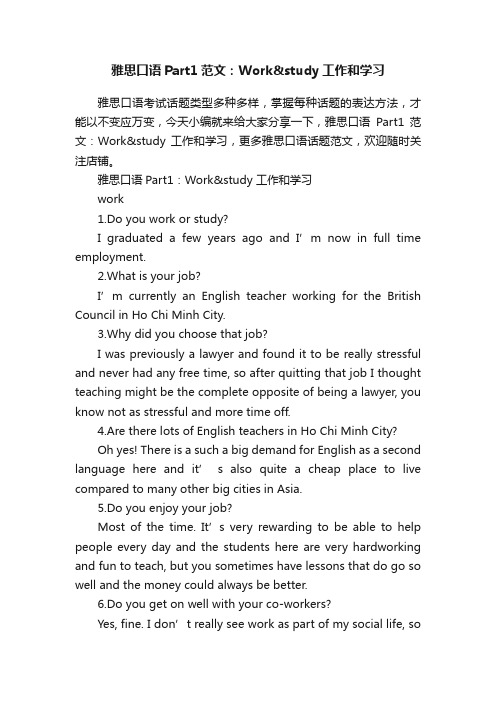
雅思口语Part1范文:Work&study工作和学习雅思口语考试话题类型多种多样,掌握每种话题的表达方法,才能以不变应万变,今天小编就来给大家分享一下,雅思口语Part1范文:Work&study 工作和学习,更多雅思口语话题范文,欢迎随时关注店铺。
雅思口语Part1:Work&study 工作和学习work1.Do you work or study?I graduated a few years ago and I’m now in full time employment.2.What is your job?I’m currently an English teacher working for the British Council in Ho Chi Minh City.3.Why did you choose that job?I was previously a lawyer and found it to be really stressful and never had any free time, so after quitting that job I thought teaching might be the complete opposite of being a lawyer, you know not as stressful and more time off.4.Are there lots of English teachers in Ho Chi Minh City?Oh yes! There is a such a big demand for English as a second language here and it’ s also quite a cheap place to live compared to many other big cities in Asia.5.Do you enjoy your job?Most of the time. It’s very rewarding to be able to help people every day and the students here are very hardworking and fun to teach, but you sometimes have lessons that do go so well and the money could always be better.6.Do you get on well with your co-workers?Yes, fine. I don’t really see work as part of my social life, soI don’t socialis e with them, so I suppose I could be more friendly, but it’s just my nature to be a bit colder withcolleagues. I think it’s more professional to be that way.7.What was your first day at work like?There were lots of teachers starting at the same time as me, 10 I think, so we all had a big induction day. The more senior teachers ran workshops with us to familarise us with the different systems they had and then we went for a team dinner in the evening.8.What responsibilities do you have at work?All of the teachers main responsibility is to plan good lessons and then teach them to the best of our ability. On top of that we have several admin. tasks to carry out like mark homework, fill out attendance sheets and write reports.9.Would you like to change your job in the future?Yes, as I said before, I like working by myself, so I would like to be my own boss. I’ m currently developing my own website, so if it’s successful I will leave teaching and work on it full time. This will also give me more time to work on other projects.10.What is your typical day like in work?I normally have 2 or 3 classes in the evening and I start the day by doing all the planning at home. This normally takes between an hour or two depending on the lessons. I then take the rest of the day to spend with my family, before going to work around 3 to print off my materials and then I teach all evening.11.What would you change about your job?As with most English teachers, we have to teach what is on the curriculum and this can mean that you are teaching some things that are quite boring or not very useful for your students, so I would like to have more freedom to teach outside thesyllabus.12.What do you do?Presently, I am working with Fox Traveller as a host for their show that involves travelling around India and discovering its culture and people. We already have covered the southern part of India and now we shall be moving towards the eastern part. The show will go on air in January next year.13.What are your responsibilities at your work place?My main objective is to make sure that we get the information required. So, for instance, if we are travelling to Mysore, instead of talking about the places everyone goes, I need to make sure we cover the places no one ever has. Like the best and the cheapest place to eat. It requires lot of research and I mostly go to the place 10 days before our team arrives.14.How many hours do you work each day?Well, we don’t have any particular routine. Sometimes the work demands us to work ten hours, sometimes more than that, sometimes less. So, it is all on the location and the time it requires to give us the required information. Also, for me this is something that I love, so mostly work doesn’t seems like work.15.Do you enjoy your work?Oh! I love it. The feeling that you get after meeting so many people and talking with them and realizing how happy they are after all the issues they have. I remember we went out to shoot a village in Mysore and initially we thought the people would be very unhappy because of the limitations they had, but to our surprise they were all very happy and it was fun knowing their ways of living.16.If given a chance to change your work place, would you do that?At present, my workplace is great for me. I am loving the people I work with and enjoy the work that I am doing. So as of now, I don’t see myself changing the place. But, may be after some time, if the work is getting repetitive or there is no more learning for me, I may change.17.Is there some other kind of work you would prefer to do?I surely love the work that I do, but may be if time allows, instead of hosting shows I would prefer writing about my experiences of the places I visit. May be because when one writes a lot more gets expressed which is not possible why saying things off in television.18.If you could change your profession, what would you do?Well, I think may be I will open a company that gives equal education rights to people. While travelling, I realized that there are so many children who don’t ge t education, and even if they get it is not of good quality. So, I will open a business that provides good quality education to people who cannot afford it.Study1.Do you work or study?I’m currently a student at Queen’s University, Belfast.2.What do you study?I study law because it’s a really well thought of degree and I’m hoping to pursue it as a career in the future.3.Is it a popular subject at your university?Very popular, in fact it’s one of the most sought after courses. I think there are about 350 people reading law at Queen’s. I think lots of student’s parents want them to study law so they can get a good job after they graduate.4.Do you enjoy studying it?It’s such a huge subject that there will always be parts youlike and parts you don’ t li ke. I find Human Rights fascinating because it can really make a difference to peoples’ lives. On the other hand, modules like Land Law and Equity are really boring.5.Do you get along with your classmates?Yes, they are all really great. Most people like to socialise together in the evenings and this makes us a very tight group. If you know someone socially, it is much easier to work together in class.6.If you could change to another subject, what would it be?I planned to study medicine, but then when I went on work experience I fainted at the first sight of blood, so definitely not that. I’m a real history buff and read books about World War 2 all the time, so I suppose it would have to be Modern History.7.Do you plan to use the subject you are studying in the future?Yes, I’ve already started to apply for jobs as a lawyer. We normally have to secure a job a year before we graduate and then work very hard to get a high overall mark. After that, I will probably do a Masters in law to become a specialist in one particular area.8.What is the most difficult part of your subject?You have to remember lots of legislation and cases and not only remember their names, but also how the affect each part of the law and how they interact with each other. Physically it can also be exhausting because we have to read very dense texts fora few hours every day.9.What would like to study in the future?As I said before, my favourite type of law is Human Rights, so I would like to do a masters in International Human Rights Law. it’s right at the cutting edge of my field and there are also lotsof very high profile cases in the media, so it’s really exciting and something I would like to become an expert in.10.Why did you choose your university?Mostly because it is close to my hometown and most of my friends were going there. I kind of regret it now. It’s a great university, but because it’s so close to home it doesn’t give you much of a chance to experience new things and meet new people. If I were to choose again, I’d stu dy abroad.雅思口语考试中你所不知的那些方法在雅思口语的考试当中,打动考官是至关重要的一点。
雅思口语第一部分参考答案

雅思口语第一部分参考答案雅思口语第一部分也称为口语考试中的“冰砖”,因为它是整个口语考试中最简单和最基础的部分。
在这个部分,你需要回答一系列个人问题,例如你的家庭、工作、爱好等。
但是,尽管这个部分比较简单,但如果你不懂得如何回答问题,可能会影响口语考试的成绩。
下面是一些雅思口语第一部分参考答案,希望能对备考的同学有所帮助。
题目一:你的家乡在哪里?可能的回答:•我来自山东省济南市,这是一个历史悠久的城市,也是中国五大老字号之一。
•我的家乡在广东省深圳市,这是一个非常先进和现代化的城市,在中国的改革开放中发挥了很重要的作用。
•我来自马来西亚吉隆坡,这是一个多元文化的城市,拥有许多美食和旅游景点。
这个问题是相当基础的,而且你可能会预料到。
要回答此问题,可以先简单介绍你的家乡,包括它在哪里,它有何特殊之处。
在回答时释放一些氛围,例如你的家乡有什么美食、旅游景点或特殊传统等等。
最后,你可以再加上一句话表达你的爱意。
题目二:你的工作是什么?可能的回答:•我是一名教师,在一所小学任职。
我主要教小学三年级的学生,最喜欢看到他们学习新知识的瞬间!•我是一名市场执行主管。
我的工作包括为公司制定市场计划,协调市场活动,并与其他部门合作以确保成功。
•我是一名自由职业者。
我最近开始写博客和电子书,希望能通过我的作品来帮助和激励别人。
在回答此问题时,要简要介绍你目前的职位,并简单介绍你的工作职责。
如果你很喜欢你的工作,可以分享一些有关你喜欢工作的原因。
否则,你可以尝试将你的答案转移到你想在未来的工作中发挥作用的领域。
题目三:你有什么爱好?可能的回答:•我喜欢阅读。
每周我会切换不同的书籍类型,以保持对不同领域知识的兴趣。
•我爱跳舞。
跳舞可以缓解我对工作的压力,还能使我保持身体健康。
•我经常参加志愿者活动。
我认为为他人服务是一种很棒的方式,使自己更有价值。
此问题是谈论你的爱好。
确保您的爱好确实是你喜欢做的事情。
在介绍你的爱好时,可以谈论让你开心的、健康的、与社区相连的等方面带来的好处。
2019年9-12月雅思口语PART1-教师节更新版
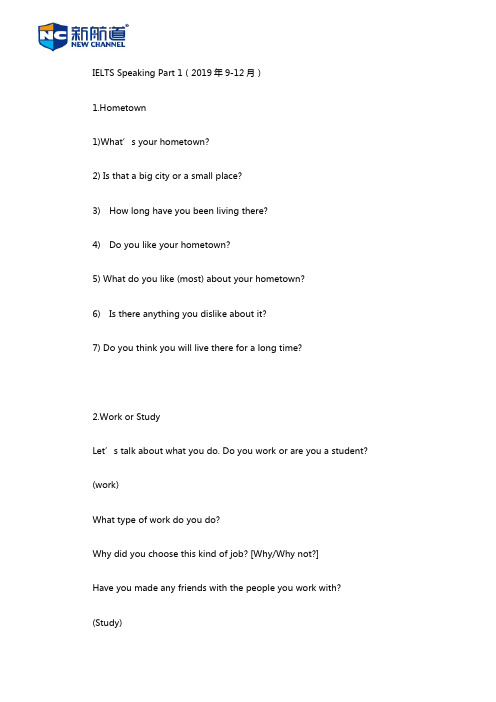
IELTS Speaking Part 1(2019年9-12月)1.Hometown1)What’s your hometown?2) Is that a big city or a small place?3) How long have you been living there?4) Do you like your hometown?5) What do you like (most) about your hometown?6) Is there anything you dislike about it?7) Do you think you will live there for a long time?2.Work or StudyLet’s talk about what you do. Do you work or are you a student? (work)What type of work do you do?Why did you choose this kind of job? [Why/Why not?]Have you made any friends with the people you work with? (Study)Where are you studyingWhy did you choose to study there? [Why/Why not?]Have you made any friends with the people you study with? [Why/Why not?]3.Where do you liveLet’s talk about where you liveHow far from here do you live in?Do you prefer to live in the city or the countryside? [Why/Why not?]Are the transports near your place very good? [Why/Why not?]Do you live in a house or a flat?Can you describe the place where you live?Please describe the room you live in.4.The area you live in1)Where do you like to go in that area?2)Do you know any famous people in your area?3)What are some changes in the area recently?4)Do you like the area that you live in?Place1.Countryside [new]1)Which part do you live in now, in the city or countryside?2)What do you think of living in the countryside? Do you like it?3)Have you ever lived in the countryside before/when you were child?4)What do you/people do in the countryside?2. Street market1)What do people in your country prefer? Street market or supermarket? [Why?]2)What do you usually buy from street market? [Why?]3)When was the last time you went to a street market? [Why/Why not?]4)Do you go street market more now than when you were younger? [Why/Why not?]3. Childhood Leisure Time/Outdoor1)Where did you play when you were a child?2)What games did you play when you were a child?3)Where did you prefer to play when you were a child, indoor or outdoor?4)Do you think children should take part in more outdoor activities?5)Did you often go to your friend’s home to play?6)Did you like playing in your friend’s home?7)Did you often invite friends to come to play in your home when you were a child?4.Rubbish1)Would people just throw rubbish on the street? [Why/Why not?]2)What would you do when you see rubbish on the street? [Why?]3)Do you think it is easy to teach people not to throw trash around? [Why/Why not?]4)How important is it to keep the city clean? [Why/Why not?]5.Rainy days1)Do you like rainy days? [Why?]2)How often does it rain where you live?3)Do you think rainy day are good for studying? [Why?]4)Do young people in your country hate rainy days? [Why/Why not?]6.Weather1)What`s the weather usually like in your city?2)What kind of weather do you like most?3)Do you usually pay attention to weather forecasts?4)Has the weather in your country changed much over the past few years?。
雅思口语part1范文
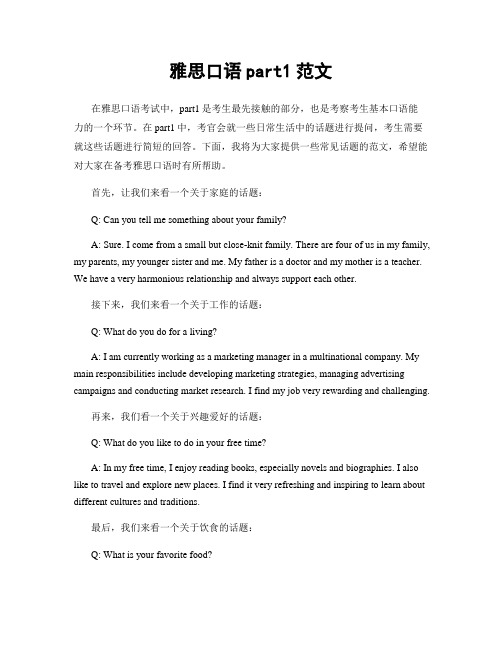
雅思口语part1范文在雅思口语考试中,part1是考生最先接触的部分,也是考察考生基本口语能力的一个环节。
在part1中,考官会就一些日常生活中的话题进行提问,考生需要就这些话题进行简短的回答。
下面,我将为大家提供一些常见话题的范文,希望能对大家在备考雅思口语时有所帮助。
首先,让我们来看一个关于家庭的话题:Q: Can you tell me something about your family?A: Sure. I come from a small but close-knit family. There are four of us in my family, my parents, my younger sister and me. My father is a doctor and my mother is a teacher. We have a very harmonious relationship and always support each other.接下来,我们来看一个关于工作的话题:Q: What do you do for a living?A: I am currently working as a marketing manager in a multinational company. My main responsibilities include developing marketing strategies, managing advertising campaigns and conducting market research. I find my job very rewarding and challenging.再来,我们看一个关于兴趣爱好的话题:Q: What do you like to do in your free time?A: In my free time, I enjoy reading books, especially novels and biographies. I also like to travel and explore new places. I find it very refreshing and inspiring to learn about different cultures and traditions.最后,我们来看一个关于饮食的话题:Q: What is your favorite food?A: My favorite food is sushi. I love the combination of fresh fish and rice, and the delicate flavors of different types of sushi. Whenever I have the chance, I would go to a Japanese restaurant to satisfy my craving for sushi.以上就是我为大家准备的一些part1范文,希望能帮助大家更好地备考雅思口语。
雅思口语Part1范文:Study/Major/Work学习工作专业话题

Do you work or are you a student?Is that a popular subject in your country?What are the most popular subjects in China?Why did you choose that university?What are your favourite classes/ courses/ subjects at university?I’m currently a student at a High School. Im studying A’ Levels in order to go to a university in Britain.我现在是一所高中的学生。
为了去英国上大学,我正在学习A ‘ Levels课程。
At my school we really focus on the science subjects and English. Since most students will apply to a foreign UniversityIn my opinion business is probably the first choice for most students. Nearly everyone wants to be rich so they think that majoring in business would help them achieve this goal. I guess the second most prevalent subject would be computing. You know many students like to play computer games so there is no doubt that people are into that subject.在我的学校,我们真正关注的是科学和英语。
2023年雅思口语话题Part1工作教师版
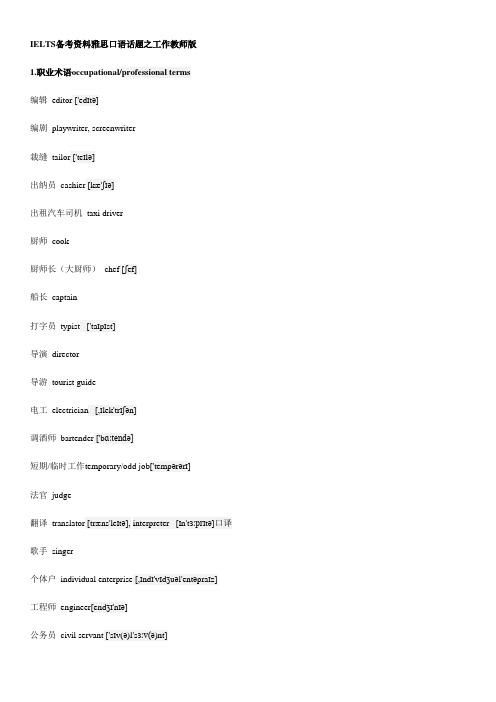
IELTS备考资料雅思口语话题之工作教师版1.职业术语occupational/professional terms编辑editor ['edɪtə]编剧playwriter, screenwriter裁缝tailor ['teɪlə]出纳员cashier [kæ'ʃɪə]出租汽车司机taxi driver厨师cook厨师长(大厨师)chef [ʃef]船长captain打字员typist['taɪpɪst]导演director导游tourist guide电工electrician[,ɪlek'trɪʃən]调酒师bartender ['bɑːtendə]短期/临时工作temporary/odd job['tempərərɪ]法官judge翻译translator [træns'leɪtə], interpreter[ɪn'tɜːprɪtə]口译歌手singer个体户individual enterprise [,ɪndɪ'vɪdʒuəl'entəpraɪz]工程师engineer[endʒɪ'nɪə]公务员civil servant['sɪv(ə)l'sɜːv(ə)nt]海员,水手seaman['siːmən], sailor['seɪlə]护士nurse话务员(接线生)operator会计accountant[ə'kaʊntənt]机械师(技工,机修工)mechanic[mɪ'kænɪk]计算机系统分析员computer systems analyst['ænəlɪst] 记者journalist['dʒɜːnəlɪst] ,reporter兼职part-time job建筑师architect['ɑːkɪtekt]警察policeman剪发师hair-dresser, barber['bɑːbə]律师lawyer,barrister['bærɪstə]秘书secretary模特儿model内科医生physician[fɪ'zɪʃən]男售货员salesman女售货员salesgirl, saleswoman人力资源经理human resources manager设计师designer摄影师cameraman['kæmrəmən] photographer [fə'tɒgrəfə] 失业lay-off时装设计师fashion designer跳槽job-hopping ['dʒɔbhɔpiŋ]土木工程师civil engineer外科医生surgeon['sɜːdʒən]小说家novelist['nɒvəlɪst]修理工repairman牙医dentist药剂师pharmacist['fɑːməsɪst]银行职工bank clerk职业job, vocation, profession职工,文员office clerk助理工程师assistant engineer自由工作者freelancer['friːlɑː(æ) nsə]作家writer作曲家composer[kəm'pəʊzə]舞蹈演员dancer运动员athlete['æθliːt]2..常用口语句子:What do you do?= What's your occupation?= What are you?你是做什么工作旳?occupation [ɒkjʊ'peɪʃ(ə)n]n. profession[prə'feʃ(ə)n] vocation[və(ʊ)'keɪʃ(ə)n]职业Can yon tell me a little about what you've done in the past?你能说说你过去做过旳工作吗?What did you do for a living?你此前是干什么谋生旳?He has got a temporary job.他找到了一份临时工作。
雅思口语part1话题之团队工作
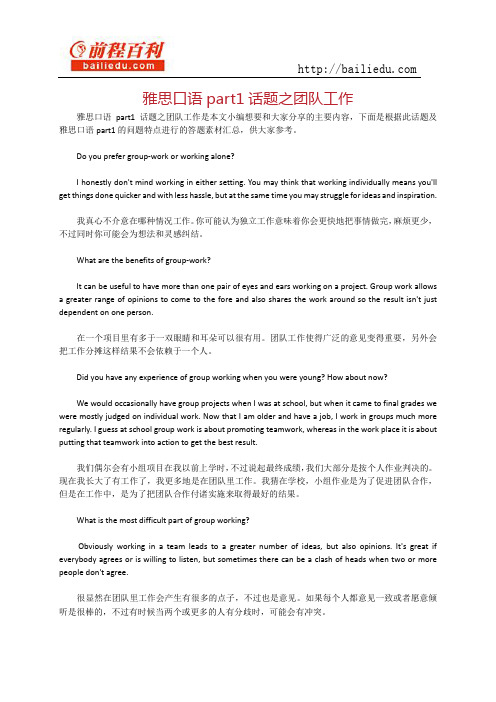
雅思口语part1话题之团队工作是本文小编想要和大家分享的主要内容,下面是根据此话题及雅思口语part1的问题特点进行的答题素材汇总,供大家参考。
Do you prefer group-work or working alone?I honestly don't mind working in either setting. You may think that working individually means you'll get things done quicker and with less hassle, but at the same time you may struggle for ideas and inspiration.我真心不介意在哪种情况工作。
你可能认为独立工作意味着你会更快地把事情做完,麻烦更少,不过同时你可能会为想法和灵感纠结。
What are the benefits of group-work?It can be useful to have more than one pair of eyes and ears working on a project. Group work allows a greater range of opinions to come to the fore and also shares the work around so the result isn't just dependent on one person.在一个项目里有多于一双眼睛和耳朵可以很有用。
团队工作使得广泛的意见变得重要,另外会把工作分摊这样结果不会依赖于一个人。
Did you have any experience of group working when you were young? How about now?We would occasionally have group projects when I was at school, but when it came to final grades we were mostly judged on individual work. Now that I am older and have a job, I work in groups much more regularly. I guess at school group work is about promoting teamwork, whereas in the work place it is about putting that teamwork into action to get the best result.我们偶尔会有小组项目在我以前上学时,不过说起最终成绩,我们大部分是按个人作业判决的。
雅思口语考试之工作类话题范例

雅思口语考试之工作类话题范例Part 1Work1.What work do you do?I am a teacher at a high school. I started there in Jan 2015 after graduating from college. I would say it is a pretty challenging job.2. Why did you choose to do that type of job?Teaching is my passion. I don't view my career as a "job" per say. I see it more as my calling in life. It is my life's purpose.3. Do you like your job?Definitely! I enjoy the variety and special projects where I can take ownership of the final product. My job provides me with both, so yes, it is a good job and I find it very rewarding.I'm not interested in my job…because it is so mundane and repetitive, two traits I despise and try to stay away from. I hope to find a better job that challenges me to aspire to new heights.4. Do you miss being a student?I definitely do! Sometimes I just wonder what would have happened if I had studied harder when I was in university. I just miss the days when I had nothing to worry about but the exams. Now, all the pressure from work and family is difficultto deal with.5. Is it very interesting?Most of the time, yes! The daily challenges from new projects provide constant opportunities to learn new things and to some extent re-invent myself. Every day is unique. My colleagues provide me with support but also healthy competition. I find my job most interesting when I am challenged to reach outside of my comfort zone.6.Is there any kind of technology you use at work?)I use mainly a laptop computer and my phone at work. Sometimes I also use a photocopier scanner, and a video camera if I'm making short promotional videos with my company. But mainly, I just use a computer.。
雅思口语第一部分话题
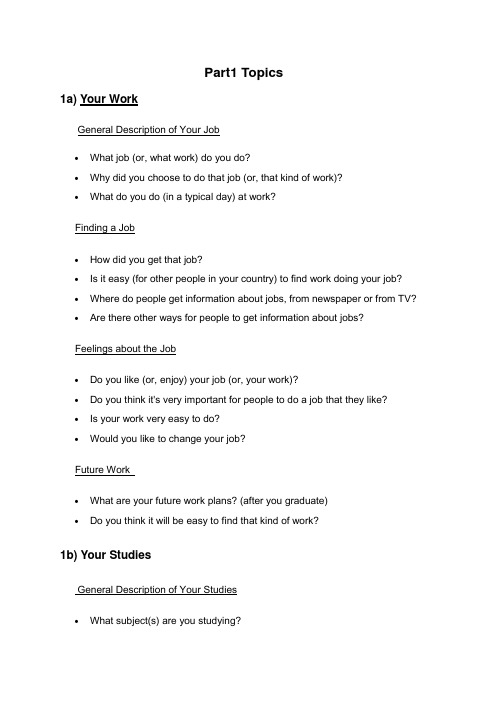
Part1 Topics1a) Your WorkGeneral Description of Your Job∙What job (or, what work) do you do?∙Why did you choose to do that job (or, that kind of work)?∙What do you do (in a typical day) at work?Finding a Job∙How did you get that job?∙Is it easy (for other people in your country) to find work doing your job?∙Where do people get information about jobs, from newspaper or from TV?∙Are there other ways for people to get information about jobs?Feelings about the Job∙Do you like (or, enjoy) your job (or, your work)?∙Do you think it's very important for people to do a job that they like?∙Is your work very easy to do?∙Would you like to change your job?Future Work∙What are your future work plans? (after you graduate)∙Do you think it will be easy to find that kind of work?1b) Your StudiesGeneral Description of Your Studies∙What subject(s) are you studying?∙Why did you choose to study that subject?∙Is that a popular subject (to study) in your country?∙Do you think it's popular because people want to gain knowledge or is there some other reason?School/University∙Do you have any recreational or entertainment activities at your school/university?Liking/Disliking Your Studies∙Do you like your subject? (= your major = your subject s if a high school student) (Why? /Why not?)∙What do you like about your subject?∙(Similar to above) What parts of your subject do you like the most?∙Do you think it's important to choose a subject you like? (Why?)2. Your HometownThe PlaceWhere do you come from?Famous∙Is your hometown famous for anything?∙(If you answer no) How could it become famous?The History of Your Hometown∙Do you know much about the history of your hometown?∙Did you learn (or, have you learned) much about the history of your hometown in school?Change∙In what ways has your hometown changed in the past few years?∙What do you think needs to change in your hometown?Transport∙What form of transport do you prefer to use in your hometown?Free Time Activities in Your Hometown∙What do people in your hometown do in their free time?3. Animals∙What's your favorite animal? (Why?)∙Are people in your country fond of animals?∙What do you think are the benefits of a child having a pet?4. Colors∙What's your favorite color? (Why?)∙Do you usually (or, often) wear clothes in your favorite color?∙Are there any colors that have a special meaning in your country?∙What color would you choose to paint the walls of your room? (Don't use, "will".)5. Food∙What food did you like to eat when you were a child?∙Do you still like that food now?∙(Similar to above) Would you want your children to eat the same food now?∙If you had children, what foods would you recommend they eat?∙Do you think it's good to (often or sometimes) take children to restaurants?6. Mobile Phones∙How often do you use it?∙When did you get your first mobile phone?∙Is there anything you dislike about using cell phones?7. Leisure Time∙How much free time (or time to relax) do you have (per week)?∙What do you do in your spare time (= free time)?∙Would you prefer to relax at home and watch TV or go out with your friends?∙Do you think it's important to (have time to) relax?8. Sport∙Do you like sport? C∙What sports do you like? (Why?)∙Do men and women feel the same about sport?∙What sports did you play when you were a child?∙What are the benefits of playing sport?9. Sounds (Noises)∙Do you prefer a quiet environment or a noisy environment?∙What natural sounds do you like (the most)? (Why?)∙What sounds do you dislike? (Why?)10. Collecting∙Do you collect anything as a hobby now?∙Do people in your country like to collect things?∙Why do you think people like collecting things?11. Languages∙How many languages can you speak?∙How did you learn (to speak) English?∙Do people in your country have many chances to practice oral English?∙If you had the chance, would you be willing to learn another language?12. Weather & Seasons∙What's the weather (usually) like in your hometown?∙How do you feel when the weather is cloudy?13. Films∙How often do you watch a film?∙What types of films do you like?∙Do you like to watch films in a cinema? (Why?/Why not?)14. Clothes and Fashion∙Where do you usually buy your clothes?∙What kinds of (or, style of) clothes do you usually wear (or, buy)?∙What types of clothes are in fashion now?∙Do you think fashion trends will be the same when you are old(er)?15. Shopping∙When was the last time you went shopping? (Include what you bought.) ∙What are some differences between men and women concerning shopping?∙Do you enjoy shopping in big shopping malls (big shopping centers)? 16. Flying∙Have you ever traveled by (= flown in a) plane?∙(Similar to above) Do you often travel by airplane?∙Do you like it (like flying)?∙How does flying compare to other forms of transport?∙Do you think you will be using aircraft more in the future?∙If you travel by plane again, where do you think you will go (or, you will be going)?17. Museums∙Are there many (or, any) museums in your hometown?∙Do you think museums are useful for visitors to your hometown/country?∙Do you think it's suitable for museums to sell things to visitors?18. News∙How do you usually get your news?∙What news topics are you most interested in watching/reading about?∙Do you ever read the news on the internet?∙How important do you think the news is?19. Holidays (= vacations = 假期)∙What do you usually do when you have holidays?∙What did you do in your last holidays?∙Would you like to go to the seaside for a holiday?∙Why do you think people who don't live near the ocean like going to the seaside for a holiday?∙Do you think holidays are important?∙Is there anything you dislike doing during holidays?∙Do you prefer spending holidays alone or with other people?20. Traveling∙Do you like traveling?∙Where do you like to go when you go traveling?∙Have you ever traveled for a long time? = Have you (ever) been on any long trips?∙How do you feel when you travel?∙Have you ever been to any unusual (or, strange) places?∙Where (which country or place) would you like to travel to (in the future)?21. Cooking∙Who usually does the cooking in your family (or, in your home)?∙Do you know how to cook?∙Would you like to (learn to) cook in the future? (If you say you don't know how to cook.)∙Do you like cooking?22. Dancing∙Do you like dancing?∙Have you ever learned to dance?∙When was the last time you danced?∙Do you like to watch dance performances?∙Why do you think some (or, many) people like to dance?23. Books∙Do you like reading books?∙What (kinds of) books do you like to read?∙Do (young) children like reading books?∙For children, what do you think are the benefits of reading?∙What (kinds of) books did you like reading when you were a child?∙Is reading books important for you now?∙Would you like to write a book?∙Do you like receiving a book as a gift?24. The Ocean∙Have you ever been to the seaside?∙How many times have you been to the seaside?∙Do you like the ocean (or, the sea; or, the seaside)?∙What would you enjoy doing if you were at the seaside?∙Would you like to live in a house near the ocean?25. Friendship∙Do you have many friends?∙What do you usually do with your friends?∙Where did you (first) meet your friends?∙Do you often make new friends?∙How do young people meet others in order to make new friends?∙Where do young people go to make new friends?∙What do they do there?∙Where do young children make new friends?∙Do you ever meet any foreigners where you live?∙Where can you (go to) speak to foreigners in your country?26. Daily Routine∙What do you do in your daily life?∙What is the best part of the day for you? (Why?)∙When do you do most of your study?∙How do you think your daily routine could be improved?27. Emails and Letters∙Do you write many letters or emails?∙What are the differences between emails and letters?∙What do you usually write about?∙Is it hard to think of what to write?∙What kind(s) of letter/email do you think is (are) the hardest to write?∙What kinds of emails (or letters) do you receive that make you feel excited?。
15个最常见的雅思口语话题及答案 Part 1
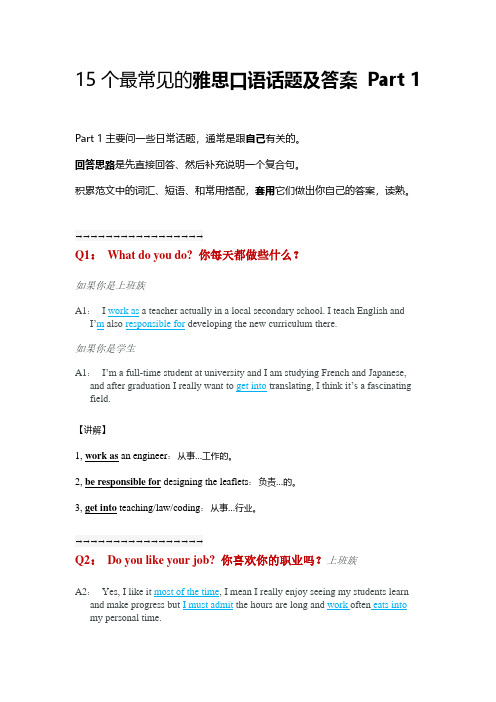
15个最常见的雅思口语话题及答案Part 1Part 1主要问一些日常话题,通常是跟自己有关的。
回答思路是先直接回答、然后补充说明一个复合句。
积累范文中的词汇、短语、和常用搭配,套用它们做出你自己的答案,读熟。
→→→→→→→→→→→→→→→→→Q1:What do you do? 你每天都做些什么?如果你是上班族A1:I work as a teacher actually in a local secondary school. I teach English and I’m also responsible for developing the new curriculum there.如果你是学生A1:I’m a full-time student at university and I am studying French and Japanese, and after graduation I really want to get into translating, I think it’s a fascinating field.【讲解】1, work as an engineer:从事…工作的。
2, be responsible for designing the leaflets:负责…的。
3, get into teaching/law/coding:从事…行业。
→→→→→→→→→→→→→→→→→Q2:Do you like your job? 你喜欢你的职业吗?上班族A2:Yes, I like it most of the time, I mean I really enjoy seeing my students learn and make progress but I must admit the hours are long and work often eats into my personal time.【讲解】1, most of the time后面通常是要表达相反的意见。
《沪江网校雅思》雅思口语Part1 谈论工作

《沪江网校雅思》雅思口语Part1谈论工作各位烤鸭们,祝大家七夕快乐啊哈哈~今天和大家一起分享雅思口语考试Part One的必考话题之一:“Talking About Work”。
Question No.1:What work do you do?Sample Answer:Well,I work in the field of marketing,which means I have to keep looking for effective ways for my company to promote its products,especially those latest ones.Question No.2:Why did you choose to do this kind of work?Sample Answer:Well,I chose it because first of all,it was what I majored in back to college;and second of all,it has been one of my ideal jobs.Question No.3Do you enjoy your work?Sample Answer:Well,I guess it is fair for me to say I like it most of the time coz it gives a strong sense of achievement when I am able to provide some professional advice to my clients in terms of their investment plans.Question No.4:Would you like to change your current job if you could?Sample Answer:Well,if you mean right now,I have to admit that I am pretty happy about I am doing,but I might also think about it if there is a better job opportunity.。
雅思口语变题季part1新题答案:work&study
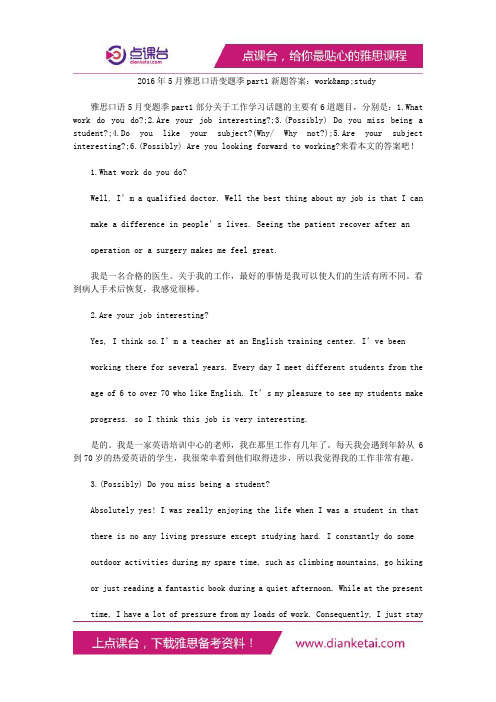
2016年5月雅思口语变题季part1新题答案:work&study雅思口语5月变题季part1部分关于工作学习话题的主要有6道题目,分别是:1.What work do you do?;2.Are your job interesting?;3.(Possibly) Do you miss being a student?;4.Do you like your subject?(Why/ Why not?);5.Are your subject interesting?;6.(Possibly) Are you looking forward to working?来看本文的答案吧!1.What work do you do?Well, I’m a qualified doctor. Well the best thing about my job is that I can make a difference in people’s lives. Seeing the patient recover after an operation or a surgery makes me feel great.我是一名合格的医生。
关于我的工作,最好的事情是我可以使人们的生活有所不同。
看到病人手术后恢复,我感觉很棒。
2.Are your job interesting?Yes, I think so.I’m a teacher at an English training center. I’ve been working there for several years. Every day I meet different students from the age of 6 to over 70 who like English. It’s my pleasure to see my students make progress. so I think this job is very interesting.是的。
你想做的工作雅思口语

你想做的工作雅思口语作为一名雅思口语考试的考生,你可能被要求谈论你想做的工作。
在雅思口语考试中,这个话题是很常见的,因此准备一份精彩的答案非常重要。
下面是一份关于你想做的工作的雅思口语范文,主要从为什么选择这个职业、职业的优势和职业的未来前景等方面展开描述。
我一直梦想成为一名教育工作者。
我选择这个职业的原因有很多,我热爱孩子,我希望能够对他们的成长起到积极的影响。
教育工作让我有机会去影响年轻人的思想和品德,这对我来说是一种巨大的满足和成就感。
我相信教育是改变社会的有效途径,因此选择成为一名教育工作者是我实现人生价值的重要方式。
选择成为一名教育工作者有很多优势。
教育工作者是社会发展的桥梁,他们通过教育的方式来培养未来的人才,这给予他们非常重要的社会地位。
教育工作者有机会不断学习和提高自己的专业水平,他们可以不断的接触新知识、新技能,这样可以保持自己的思维活跃和敏锐。
教育工作者可以通过自己的努力和智慧,塑造未来一代的人才,这是非常宝贵的使命和责任。
在未来,教育工作者的前景是非常广阔的。
随着社会的发展,对于优质教育的需求会越来越大,因此教育工作者的需求也会增加。
随着科技的不断进步,教育方式会越来越多样化,这会给予教育工作者更多的发展空间和机会。
教育工作者可以通过自己的努力和创新,将教育工作发展成为一个有利于社会发展、有利于个人成长的行业。
我相信成为一名教育工作者是我人生的使命和责任,我愿意为此不断学习和努力,成为一名优秀的教育工作者。
我也相信教育工作者的未来是非常有前景的,我希望能够通过自己的努力,为社会的发展和人才的培养做出自己的贡献。
雅思口语话题Part 1学习教师版
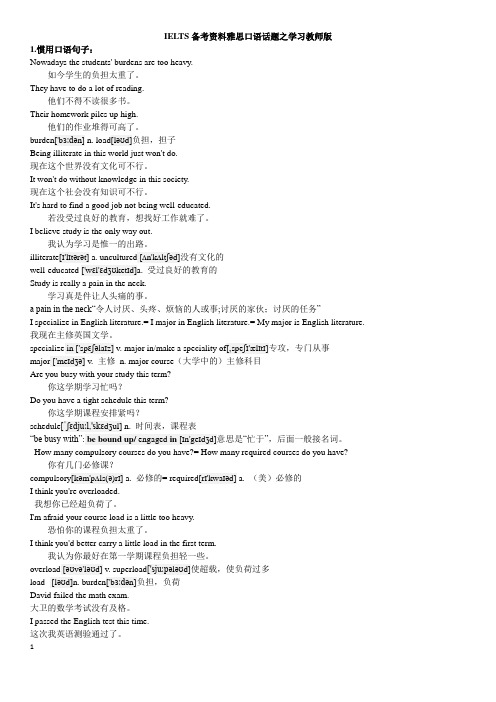
IELTS备考资料雅思口语话题之学习教师版1.惯用口语句子:Nowadays the students' burdens are too heavy.如今学生的负担太重了。
They have to do a lot of reading.他们不得不读很多书。
Their homework piles up high.他们的作业堆得可高了。
burden['bɜːdən] n. load[ləʊd]负担,担子Being illiterate in this world just won't do.现在这个世界没有文化可不行。
It won't do without knowledge in this society.现在这个社会没有知识可不行。
It's hard to find a good job not being well-educated.若没受过良好的教育,想找好工作就难了。
I believe study is the only way out.我认为学习是惟一的出路。
illiterate[ɪ'lɪtərət] a. uncultured[ʌn'kʌltʃəd]没有文化的well-educated ['wɛl'ɛdʒʊketɪd]a. 受过良好的教育的Study is really a pain in the neck.学习真是件让人头痛的事。
a pain in the neck“令人讨厌、头疼、烦恼的人或事;讨厌的家伙;讨厌的任务”I specialize in English literature.= I major in English literature.= My major is English literature. 我现在主修英国文学。
specialize in['spɛʃəlaɪz] v. major in/make a speciality of[,speʃɪ'ælɪtɪ]专攻,专门从事major['meɪdʒə] v. 主修n. major course(大学中的)主修科目Are you busy with your study this term?你这学期学习忙吗?Do you have a tight schedule this term?你这学期课程安排紧吗?schedule[ˈʃɛdjuːl,'skɛdʒul] n. 时间表,课程表“be busy with”: be bound up/ engaged in [ɪn'geɪdʒd]意思是“忙于”,后面一般接名词。
- 1、下载文档前请自行甄别文档内容的完整性,平台不提供额外的编辑、内容补充、找答案等附加服务。
- 2、"仅部分预览"的文档,不可在线预览部分如存在完整性等问题,可反馈申请退款(可完整预览的文档不适用该条件!)。
- 3、如文档侵犯您的权益,请联系客服反馈,我们会尽快为您处理(人工客服工作时间:9:00-18:30)。
雅思口语话题Part1工作教师版
IELTS备考资料雅思口语话题之工作教师版
1.职业术语occupational/professional terms
编辑editor ['edɪtə]
编剧playwriter, screenwriter
裁缝tailor ['teɪlə]
出纳员cashier [kæ'ʃɪə]
出租汽车司机taxi driver
厨师cook
厨师长(大厨师)chef [ʃef]
船长captain
打字员typist ['taɪpɪst]
导演director
导游tourist guide
电工electrician [,ɪlek'trɪʃən]
调酒师bartender ['bɑːtendə]
短期/临时工作temporary/odd job['tempərərɪ]
法官judge
翻译translator [træns'leɪtə], interpreter [ɪn'tɜːprɪtə]口译歌手singer
个体户individual enterprise [,ɪndɪ'vɪdʒuəl'entəpraɪz]
工程师engineer[endʒɪ'nɪə]
公务员civil servant ['sɪv(ə)l'sɜːv(ə)nt]
海员, 水手seaman['siːmən], sailor['seɪlə]
护士nurse
话务员(接线生)operator
会计accountant[ə'kaʊntənt]
机械师(技工,机修工)mechanic[mɪ'kænɪk]
计算机系统分析员computer systems analyst ['ænəlɪst]
记者journalist['dʒɜːnəlɪst] ,reporter
兼职part-time job
建筑师architect ['ɑːkɪtekt]
警察policeman
理发师hair-dresser, barber['bɑːbə]
律师lawyer,barrister['bærɪstə]
秘书secretary
模特儿model
内科医生physician [fɪ'zɪʃən]
男售货员salesman
女售货员salesgirl, saleswoman
人力资源经理human resources manager
设计师designer
摄影师cameraman['kæmrəmən] photographer [fə'tɒgrəfə] 失业lay-off
时装设计师fashion designer
跳槽job-hopping ['dʒɔbhɔpiŋ]
土木工程师civil engineer
外科医生surgeon ['sɜːdʒən]
小说家novelist ['nɒvəlɪst]
修理工repairman
牙医dentist
药剂师pharmacist['fɑːməsɪst]
银行职员bank clerk
职业job, vocation, profession
职员,文员office clerk
助理工程师assistant engineer
自由工作者freelancer ['friːlɑː(æ) nsə]
作家writer
作曲家composer[kəm'pəʊzə]
舞蹈演员dancer
运动员athlete['æθliːt]
2..惯用口语句子:
What do you do?= What's your occupation?= What are you?
你是做什么工作的?
occupation [ɒkjʊ'peɪʃ(ə)n]n. profession[prə'feʃ(ə)n] vocation [və(ʊ)'keɪʃ(ə)n]职业
Can yon tell me a little about what you've done in the past? 你能说说你过去做过的工作吗?
What did you do for a living?
你以前是干什么谋生的?
He has got a temporary job.
她找到了一份临时工作。
She works in the office as a temporary.
她在办公室里做临时雇员。
temporary ['temp(ə)rərɪ] a. occasional[ə'keɪʒ(ə)n(ə)l]临时的,暂时的n. 临时工,临时雇员
Is your job part-time or full-time?
你做的工作是兼职的还是全职的?
Don't you want to get a stable job?
你不想找份稳定的工作吗?
stable ['steɪb(ə)l] a. steady ['stedɪ]稳定的
I have to work overtime every day.
我不得不每天都加班。
We are not paid extra for overtime.
我们加班没有加班费。
I have to work for 13 hours a day, too tired.
我每天都得工作13个小时,太累了。
overtime ['əʊvətaɪm]ad. 超过地,加班地n. extra work 加班,加班时间
We have to work flat out to get the job done.
我们必须尽全力把工作完成。
We have to stay up late to get the job finished.
我们必须熬夜把工作完成。
flat out: teeth and nail, break one's neck, with all one's might “竭尽全力地,全力以赴地”。
